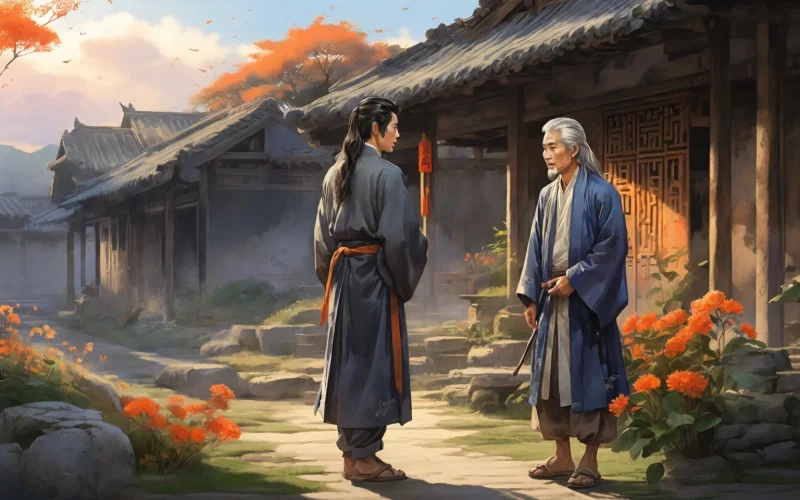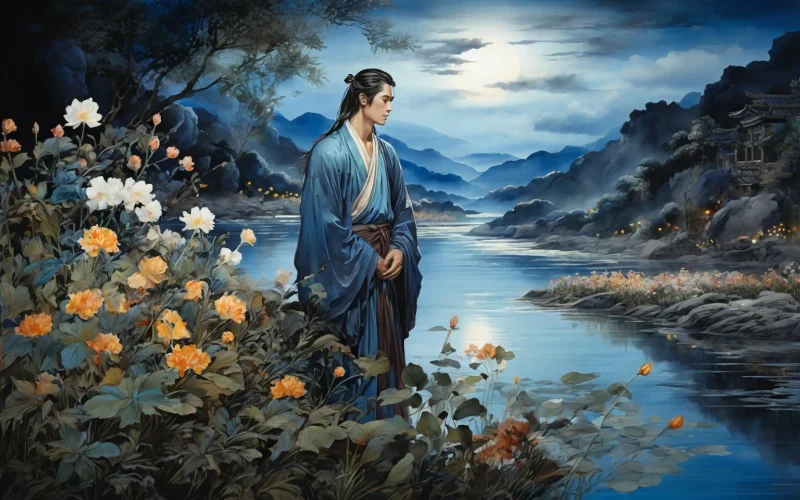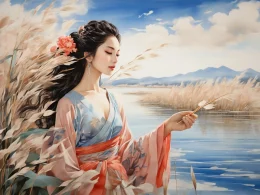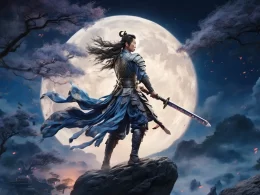Where there's life, there will be death:
This truth is well known since old days.
Where can we find immortal breath
Exhaled in superhuman ways?
Old friends tell me a jar of wine
Would make me forget weal and woe.
After drinking nectar divine,
Even to Heaven I won't go.
Is Heaven far from our good earth?
Following nature, you'll go high.
The crane in cloud with wings of worth
Flies to and fro from earth to sky.
I have been firm in my belief
And in my life for forty years.
My mind is free of joy and grief,
Though long my body changed appears.
Original Poem
「连雨独饮」
陶渊明
运生会归尽,终古谓之然。
世间有松乔,于今定何间。
故老赠余酒,乃言饮得仙。
试酌百情远,重觞忽忘天。
天岂去此哉,任真无所先。
云鹤有奇翼,八表须臾还。
自我抱兹独,僶俛四十年。
形骸久已化,心在复何言。
Interpretation
This poem was composed in 404 CE when Tao Yuanming was forty years old. During a period of continuous rainy days spent drinking alone in solitude, he used the occasion of drinking to reflect on life's philosophy, expressing his attitude of compliance with natural laws while criticizing the pursuit of immortality through supernatural means, and affirming the "authentic way of being." This is not merely a drinking poem but a deeply philosophical work filled with profound contemplation, reflecting Tao's life attitude of not chasing fame and fortune nor engaging in falsehoods.
First Couplet: "运生会归尽,终古谓之然。"
Yùn shēng huì guī jìn, zhōng gǔ wèi zhī rán.
"All existence must eventually end—this has been said since ancient times."
The poet begins by directly stating the "law of life and death" in a philosophical tone, revealing the finite nature of human life and establishing the poem's calm and rational foundation.
Second Couplet: "世间有松乔,于今定何间。"
Shìjiān yǒu Sōng Qiáo, yú jīn dìng hé jiān.
"The world speaks of Song and Qiao—but where are they now?"
Questioning the authenticity of immortality legends, this couplet prompts deep reflection on life attitudes, expressing the poet's clear-eyed skepticism toward empty fantasies.
Third Couplet: "故老赠余酒,乃言饮得仙。"
Gù lǎo zèng yú jiǔ, nǎi yán yǐn dé xiān.
"An elder gifted me wine, claiming drinking could make one immortal."
With humorous tone, the poet introduces the theme of drinking, transitioning from supernatural claims to the joys of reality.
Fourth Couplet: "试酌百情远,重觞忽忘天。"
Shì zhuó bǎi qíng yuǎn, chóng shāng hū wàng tiān.
"A sip makes worldly concerns fade; deeper cups make heaven forgotten."
Describing the transcendent state achieved through drinking, this extends to spiritual freedom beyond material constraints, reflecting the ideal of "authentic being."
Fifth Couplet: "天岂去此哉,任真无所先。"
Tiān qǐ qù cǐ zāi, rèn zhēn wú suǒ xiān.
"Would heaven truly depart? By being authentic, one need not strive."
The rhetorical question emphasizes that conforming to nature and returning to one's true self is the proper path to enlightenment, demonstrating philosophical transcendence.
Sixth Couplet: "云鹤有奇翼,八表须臾还。"
Yún hè yǒu qí yì, bā biǎo xūyú huán.
"Cloud-riding cranes have miraculous wings, traversing all realms in moments."
Referencing the legend of Wangzi Qiao riding cranes to immortality, this line still carries negation, implying all worldly pursuits are ultimately illusory.
Seventh Couplet: "自我抱兹独,僶俛四十年。"
Zì wǒ bào zī dú, mǐn miǎn sìshí nián.
"Holding fast to this belief alone, I've persevered forty years."
Expressing his unwavering commitment to the principle of "authentic being," this also reveals feelings of aloofness and solitude.
Eighth Couplet: "形骸久已化,心在复何言。"
Xíng hái jiǔ yǐ huà, xīn zài fù hé yán.
"The body will long transform, but what words suffice for this enduring heart?"
The concluding couplet returns to the philosophical theme, demonstrating the poet's enlightened perspective and leaving lasting resonance.
Holistic Appreciation
"Drinking Alone During Continuous Rain" is a representative work that uses drinking to express life philosophy. Tao Yuanming begins by stating "all existence must eventually end," showing his clear understanding of life's finitude. Through questioning immortality legends and transitioning to the carefree state of drinking and "authentic being," the poet demonstrates a liberated mindset free from worldly constraints. While composed under the influence of alcohol, the poem doesn't indulge in revelry but uses drinking to convey philosophical reflections, chronicling his decades-long commitment to authenticity and rejection of falsehoods. The "drinking alone" imagery carries implicit social critique while affirming personal conviction.
Artistic Merits
This poem integrates argumentation, narration and lyricism, blending philosophy seamlessly into poetry. Structurally progressive, it moves from mortality to immortality legends, then drinking experience before concluding with "authentic being," creating perfect coherence. The plain language contains profound meaning, employing rhetorical questions and transitions to create poetic dynamism where reason and emotion merge. Historical allusions like "Song and Qiao" and "cloud-riding cranes" add cultural depth and far-reaching resonance through their symbolic use.
Insights
The life attitude reflected in this poem rejects immortality fantasies while celebrating natural compliance and authentic living. It teaches us not to evade mortality but to maintain purity and peace within finite existence. The poet's "authentic being" philosophy isn't passive withdrawal but wise life orientation, showing how independence and clarity can be preserved even amidst chaos or solitude.
Poem translator
Xu Yuanchong (许渊冲)
About the poet

Tao Yuanming(陶渊明), 365 – 427 CE, was a poet, literary figure, fu writer, and essayist active during the late Eastern Jin and early Liu Song dynasties. Born in Chaisang (near present-day Jiujiang, Jiangxi Province), he pioneered a new genre of pastoral-themed literature, expressing profound philosophical insights through simple language. His poetic style became an enduring aesthetic standard in classical Chinese poetry.











